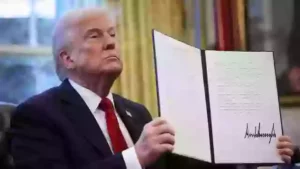The introduction of a new reciprocal tariff policy by President Trump, celebrated as "Liberation Day," is positioning the U.S. in a more assertive trade stance, prompting negotiations with nations that have benefitted from imbalanced trade agreements.
Trump Declares Economic Liberation with New Tariff Policy

Trump Declares Economic Liberation with New Tariff Policy
President Trump announces a bold tariff strategy aimed at restoring trade fairness, drawing mixed reactions from global leaders.
Standing next to Israeli Prime Minister Benjamin Netanyahu, President Donald Trump proclaimed a significant shift in America’s approach to international trade on Monday. He heralded the unveiling of a new reciprocal tariff policy as a revolutionary moment, stating that “virtually every country wants to negotiate” as the rollout looms on Wednesday.
Describing the previous week’s announcement as “Liberation Day,” Trump emphasized that this policy marks a pivotal moment in regaining America’s trade rights after enduring years of disadvantageous treaties. The initiative aims to impose equivalent tariffs on nations that have previously enjoyed lower U.S. import tax rates while heavily taxing American products in return.
Trump asserted, “No more free ride,” explaining that the new rules mean, “If you charge us 25% to sell American cars in your country, we’re charging you the same.” He underscored that the implementation of the policy is already attracting global attention, with leaders eager to reopen negotiations, concerned about the repercussions of losing access to the lucrative U.S. consumer market under stricter terms.
This bold maneuver has reverberated through the global economy, compelling both allies and adversaries to reassess their trading strategies. Trump framed the new policy not as isolating the U.S., but rather as a commitment to fairness and strength. He reiterated that America would no longer accept being perceived as “the world’s piggy bank.”
The new tariff plan is poised to challenge economies such as China and Germany, along with traditional U.S. allies who have previously held tariff advantages over American manufacturers. Trump noted that discussions are already behind the scenes, with various foreign leaders showing openness to lowering trade barriers to maintain their ties with Washington.
While supporters herald the policy as a necessary correction to years of global trading practices, opponents are cautious about possible retaliatory actions and increased consumer prices. Nonetheless, Trump maintains resolve, stating, “We’re not starting a trade war—we’re ending one that was quietly killing American jobs.”





















